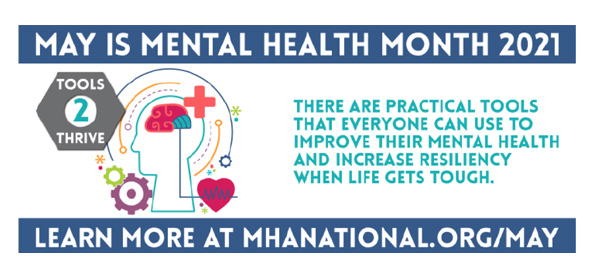JOLIET, IL – Mental Health Month, which takes place each May, has been around since the 1940s. As we head toward the conclusion of this year’s edition, the question might be: Could this possibly be the most pivotal Mental Health Month we have ever had?
That question, of course, comes from the fact that we are coming out of the COVID-19 pandemic. And the number one concern just might be not WHERE but “HOW do we go from here?”
In other words, while there is so much worry that the “mental health effects” from the pandemic will last long into the future, what about looking at “positive growth” from the pandemic lasting far into the future as well?
Dr. Joseph Troiani, Behavioral Health Director for the WCHD (Will County Health Department), says that in addition to all the tragic loss and illness from the pandemic, there’s something else that must be realized as well. And that would be connections people often made with others because they NEEDED to reach out to someone for comfort.
“One way we responded during the pandemic,” Dr. Troiani explained, “was we deliberately reached out and connected over the phone, e-mail, or the internet. With all the limitations we had, there was less ‘I’ll get back to you later’ and more ‘I need to talk to you.’ So let’s keep doing that, let’s keep reaching out, as we certainly have the technology to do so.”
Dr. Troiani says one reason to keep reaching out is to be prepared for whatever the next crisis in our lives might be. In fact, focusing on the positive growth from this pandemic, and what it can do for us mentally in the long run, is a very common theme right now in two very distinct ways.

WCHD Behavioral Health Director Dr. Joseph Troiani says one of the things that helped many people through the isolation of the pandemic, and can also be of benefit to our mental health now and into the future, is increased involvement as a family in simple pleasures of nature: such as bird watching or gardening.
One way is to feel less sorry for ourselves. In a recent column in the New York Times, Judith Warner talked about parents needing to “get out of crisis mode” and “stop talking with their kids about ‘the lost year.’” The column stated that instead of focusing on what we all went through, perhaps we should focus on the positive growth that resulted from it.
Dr. Troiani agrees that making sure we are “moving on with positive growth” is an important key. While he emphasizes that it’s important to not become careless with our physical health and find ourselves “in another surge,” it’s also important to get through the feeling of being held back mentally, and to focus on the future instead. “It’s similar to what Winston Churchill said,” Dr. Troiani recalled. “’When going through (heck), keep going.’”
But once we are feeling less sorry for ourselves, we then come to the second theme that is currently expressed right now: Showing more concern for others. And that means FOR EVERYONE. Writer Heidi Stevens, in a recent Mother’s Day column, asked the question of “What if we vowed to take better care of each other. And not just those related to us, but the WHOLE of us. In other words, all who need help, all who need MOTHERING?”
Dr. Troiani stated that the right perspective is needed for both “less pity for ourselves” and “more concern for others.” And in turn, that perspective improves our mental health as well.
“Let’s compare our hardships to what our grandparents and great-grandparents often went through during the wars and the depression. So often the concern was, ‘Will there be enough to feed my family?’ And sure, we know there is plenty of that today. But on the other hand, what you often see today is someone upset that the pandemic disturbed the supply chain and delayed delivery of their 96-inch flat screen TV.
“Right there,” Dr. Troiani concluded, “is where we need to focus less on our own selfish desires and more on others’ true needs. It was Harry Truman who said, “A society will be judged by how it treats its weakest members.”
For more on Mental Health Month, 2021 go to https://www.nami.org/Get-Involved/Awareness-Events/Mental-Health-Awareness-Month.
For more on Behavioral Health services at the Will County Health Department and Community Health Center, go to https://willcountyhealth.org/behavioral-health/ or https://willcountyhealth.org/behavioral-health-chc/.

